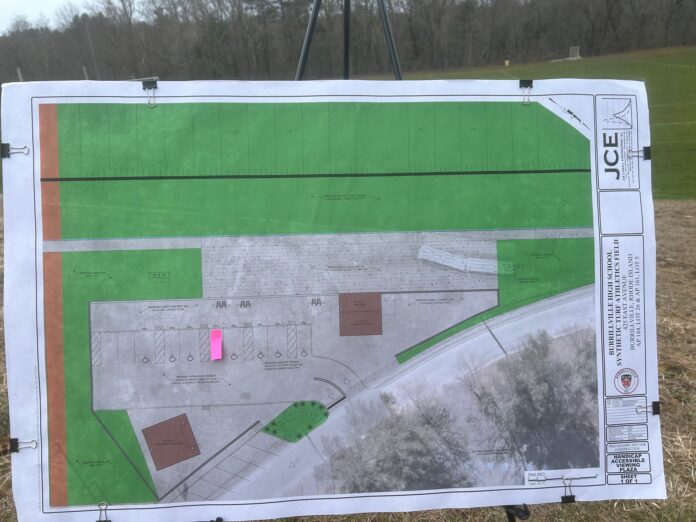
BURRILLVILLE – A citizen-led effort to halt installation of a synthetic turf field at Burrillville High School has gained some momentum, but town officials are assuring residents that the materials to be used for the East Avenue athletic facility are undergoing rigorous, independent testing, that questions will be answered and that more data will soon be presented at a public meeting.
Planning for construction of the new BHS field began several years ago, and town councilors approved an agreement with contractor FieldTurf to install the new synthetic turf in 2022. The project is set to include upgrades to lighting, an ADA-accessible viewing plaza and construction of a 1,000-seat grandstand, surrounded by fencing and a six-foot-wide walking path.

The athletics improvement is set to be financed with the town’s remaining funds from the American Rescue Plan Act, along with a separate a $500,000 federal grant obtained earlier this year, a capital improvement allocation and a bond of up to $3.2 million. Contractors broke ground on the project in May, working on the corresponding amenities and digging up grass in preparation for installation of the new material.
But that same month, resident Roberta Lacey has said that she learned of the town’s plans, and began researching the per- and polyfluoroalkyl substances – or PFAS – used in synthetic turf. The chemicals are known to pose health risks to both humans and animals, and have been linked to cancers; thyroid, immune system and liver problems.
PFAS have been used in industry and consumer products since the 1940s including many common household items. But recent changes to both state and federal law aim to discontinue use of the substances – known as forever chemicals because PFAS don’t break down easily in the environment, and can stay intact for thousands of years. The Rhode Island General Assembly passed a law in May banning the addition of PFAS to most consumer products sold or manufactured in the state by Jan. 1, 2027, with additional products banned on Jan. 1, 2029. And the Environmental Protection Agency also took recent measures to protect consumers from the chemicals, reclassifying PFAS as a hazardous substance as of this month.
Lacey’s effort to get the town to reverse course on the installation plan has gained some traction, with an online petition garnering some 740 signatures. At a meeting this month, 15 residents voiced concern with the project, and the Pascoag Utility District and Harrisville Water Department have also weighed in, with letters urging the town to exercise due diligence.
“Water contamination, or the potential for it, demands serious consideration, especially in light of the recent incidents such as MBTE contamination in Pascoag and the PFAS contamination in Oakland, which remain fresh in people’s memories,” noted a letter to town officials signed by Brayton Round, chairman of the HFD commission.
Proponents of the field argue that the trace amounts of chemicals found in the turf are considered safe, and point to the ubiquitous nature of PFAS already in the environment. At one recent meeting, an independent consultant hired by the town testified that the small quantity of chemicals found in the proposed field would not present a risk to human health. Artificial fields are thought to be easier to maintain, eliminating the need for constant watering, and able to handle more usage than traditional grass.
With the Burrillville field set to be utilized by multiple teams, including soccer, lacrosse, field hockey and football, advocates say such durability is required.
“It will allow play by our high school teams, some limited play for the middle school, and access to our local youth leagues,” said Town Council President Don Fox.
Fox pointed out this week that there have been 26 public meetings on the project at the town council level, dating back to 2015.
“This has been a well publicized process since its inception,” Fox noted in a post on social media. “It has been well thought out. We have used top notch engineering consults in the design phase. We are using a vendor that the state of Rhode Island has approved as part of a vetted list of suppliers.”
Still, opponents point out that the standards for PFAS are changing, and that it will difficult to return to a standard grass field once the town has installed the turf. Environmental advocates note issues with disposal of old turf, and note that the proposed field in Burrillville sits over an aquifer. The NFL Players Association has also been pushing for stadiums to use natural turf pointing to the greater potential for injuries as well as heat effects and possible water contamination.
Lacey recently paid for advertising encouraging residents to attend a Town Council meeting, originally scheduled to be held at Town Hall on Wednesday, August 14, to voice their concerns. Town officials have since been searching for a larger venue to accommodate the gathering, and as of this week, it remained uncertain when or where the meeting would be held.
“With the amount of recent interest in the new artificial field complex, both for and against, we have decided to hold a special meeting to be able to dedicate a full meeting to it,” Fox told NRI NOW.
Fox noted, however, that the only venues that make sense from a seating and AV standpoint are the auditoriums at either the high school or middle school and both are currently undergoing renovations. He said the council is waiting to hear when one of the auditoriums will be available.
“The goal is to hold this meeting as soon as we can schedule it,” Fox said.
Additional testing of the field materials are also underway. The independent firm TRC Consulting of Massachusetts has led the town’s testing efforts, and already conducted a study on materials similar to those intended for the Burrillville field installed elsewhere – concluding that the artificial turf would not pose a significant risk to health and safety. This week, TRC has spearheaded a second set of tests on samples of the field and infill material taken at the manufacturer’s warehouse, with California-based lab Eurofins to provide results.
“Eurofins is a pioneer lab in PFAS testing with 24 years of experience,” said Fox. “Only when the second round of testing is completed will we authorize the shipment of this material to our field. The goal is to make sure that all testing correlates and show no risk to our residents or to our aquifer.”
Fox noted that a final set of tests will be conducted once the new field and corresponding materials are delivered to Burrillville.
Town officials also plan to roll out a new page on the town website dedicated to information related to the field.
“There have been a lot of questions posed at our recent Town Council meetings. We have taken note of all of them,” said Fox. :We have also added questions that have been seen on recent social media posts. The administration will have a report addressing these questions and will be able to update it as we move forward.”
Councilors have also assured residents that despite ongoing work at the high school site, the turf itself will not be installed until at least mid-September, leaving time still for data gathering and discussion.
Fox noted that regardless of what materials are ultimately used, the plan is to have the field ready to play on by the start of the spring sports season.
“I am confident the field will be safe for our athletes and the environment,” he noted this week. “The field will be a boon to our community for generations to come and I look forward to the testing results that support this community goal.”







